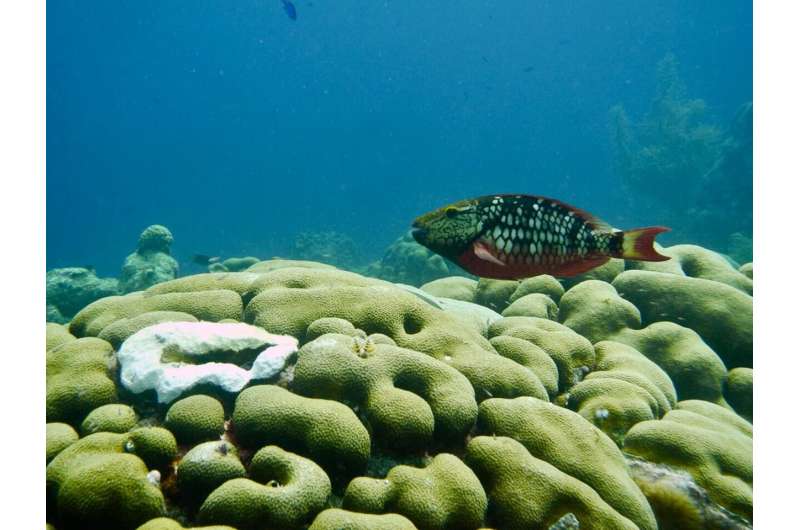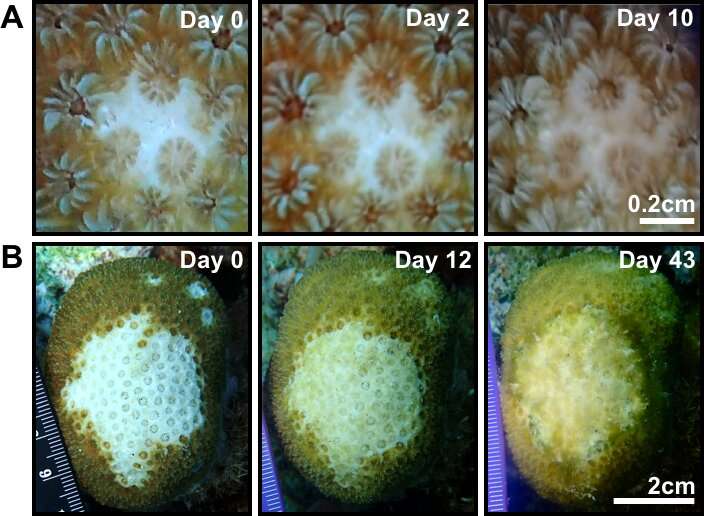Recovery of an endangered Caribbean coral from parrotfish predation

Parrotfishes are abundant herbivores that primarily graze upon algae, which may indirectly benefit corals by mitigating coral-algae competition. At a local scale, management efforts to increase populations of parrotfishes are believed to be critically important to maintaining resilient, coral-dominated reefs. Yet, some parrotfish species also occasionally graze coral—a behavior known as corallivory. Corallivory can cause the partial to total mortality of coral colonies and may have long-term impacts such as reduced coral growth and reproductive capacity and increased susceptibility to disease. While evidence suggests that parrotfishes likely have an overall net positive impact on coral communities, they may have detrimental impacts on heavily predated coral species, such as O. annularis.
To better understand the consequences of corallivory for O. annularis, researchers from California Polytechnic State University evaluated coral healing rates from parrotfish predation scars. With these data, they developed a statistical model to predict long-term coral tissue loss from snapshot surveys of parrotfish predation scars. This study, recently published in Coral Reefs, is the first to monitor coral healing rates and recovery thresholds from parrotfish predation scars in the Caribbean.
Coral healing capacity
The researchers monitored the healing of over 400 parrotfish predation scars on O. annularis coral colonies on the Caribbean islands of St. Croix and Bonaire over two months. Their research suggests that the majority of O. annularis healing occurs within the first few weeks and that scars have minimal healing after approximately 45 days. Importantly, they found that scar size strongly influences coral healing rates and recovery thresholds. They observed that smaller scars (< 1.25 cm2) often fully heal, while larger scars (>8.2 cm2) - presumably resulting from repetitive, localized predation by parrotfishes—had minimal healing.

Predicted coral tissue loss
They surveyed the size and abundance of recent parrotfish predation scars present on O. annularis colonies at a point in time and used their model to predict coral tissue loss from these scars. They observed that 87% of scars were small (<1.25 cm2) and their model predicted that these small scars would fully heal or result in minimal tissue loss. In contrast, while only 6% of observed scars were large (>8.2 cm2), their model predicted that these large scars had minimal healing and would account for 96% of the total tissue loss for parrotfish predation.
Conclusions & future directions
This study suggests that the immediate negative consequences of parrotfish corallivory for O. annularis appear to be driven primarily by a few exceptionally large predation scars. Interestingly, there was no observable difference in healing rates or total coral healing between islands despite stark contrasts in parrotfish and coral community composition on St. Croix and Bonaire. This suggests that these findings and this predictive model may be broadly applicable to other regions of the Caribbean. This study presents an important advance in understanding the recovery of a heavily predated, ecologically important, and endangered Caribbean coral from parrotfish corallivory. The group's ongoing work seeks to address how the intensity of parrotfish corallivory is influenced by the community composition of corals and parrotfishes across multiple spatial scales and regions of the Greater Caribbean.
More information: Hannah S. Rempel et al, Impacts of parrotfish predation on a major reef-building coral: quantifying healing rates and thresholds of coral recovery, Coral Reefs (2020). DOI: 10.1007/s00338-020-01977-9
Journal information: Coral Reefs
Provided by California Polytechnic State University





















